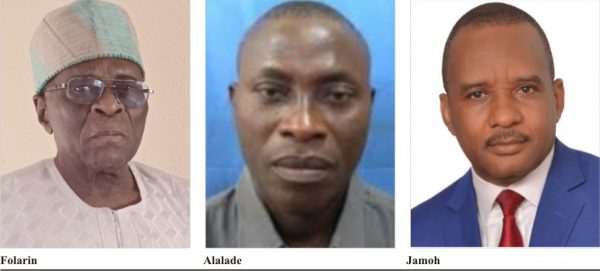Songs Of Port Rebirth

The inability of the Nigerian Ports before now to compete favourably with other ports on West and Central African Sub-region as a result of numerous factors bedevilling the ports has made the nation’s ports to be unfriendly to port users.
One grave consequence of this was the diversion of cargoes to neighbouring West African countries. These factors are well known and needed to be nipped in the bud hence, the need for pragmatic approach to eradicate or minimise the oddities.
This necessity has seen a lot of reformatory steps by the Federal Government in order to place it where it ought to be but more are still expected as the efforts have not yielded enough results.
In continuation of the quest to bring the Nigerian ports at par with international best practices, both individuals and organisations have continued to lend their voices to see that things are put in proper perspectives.
At the One Day Seminar on “Working Towards A New Port Order” organised by Shippers’ Association Lagos State (SALS) in collaboration with the Nigerian Shippers’ Council (NSC) in Lagos, last week, stakeholders lamented some of the ills that bedevil the maritime sector-A critical review of some of the issues raised at the venue of the event show that the potentials of the ports are caged in the malaise ravaging the sector.
Among the speakers at the event include the Chief Executive Officer/Executive Secretary (CEO/ES) of Nigerian Shippers’ Council (NSC) Barr. Hassan Bello, he solicited for a legal framework for the council to maximise the capacity to actualise its mandate given to it by the government.
According to him, the appointment of the council as port economic regulator has led to series of consultations with several stakeholders including shipping companies, other service providers and agencies of government, adding that the council must work together with the stakeholders to identify problems and areas which must be prioritised to facilitate the speedy transformation of the ports in accordance with global standards.
Rev. Jonathan Nicol, President, Shippers’ Association Lagos State (SALS) enumerated some factors that hinder easy clearance of cargo in the port stating that numerous agencies involved in cargo clearance charge shippers various sums before the completion of the exercise.
He said, “The Federal Government” policies brought cumbersome documentations and clearing processes in the trade, compulsorily, the following organisations in the management of cargo in Nigeria emerged.
The shipping companies, the Nigerian Ports Authority (NPA), the Terminal companies, the Banks Insurance companies, Freight forwarding associations, Standard Organisation of Nigeria (SON), the plant quarantine, NIMASA, service providers, the Nigeria Customs Service, the State Security Service among others.
He said, the problems are becoming complicated as a result of the reckless attitudes among the stakeholders and involvement of charges by each of the agencies.
Suggesting a way out of these quagmires, the SALS president enumerated some points which could salvage the port from its present doldrums.
Among the points are: full automation of the port, building of truck terminals within 100 metres always from the port, trucks to gain access to the port only when they are called upon with a computerized card, port access roads to be strictly for port users alone, customs queries minimised to a manageable proportion without allowing such cargo to remain indefinitely in the ports.
Reduction of documentation to the barest minimum, curtailing human traffic except on invitation by the port operators, reduction in the number of government agencies in the port to pave way for the Nigerian Customs Service for efficient delivery of service, electronic transmission of manifests cargo to the customs, all containers to be scanned with a miniature film showing content in the boxes, accompanying the manifest to the to the Nigerian Customs Service four days before arrival of vessel .
On the part of the Nigeria Ports Authority, he said the waiting time for vessels to berth be reduced, turnaround time of vessels within 5-7 working days, reduction in the charges of NPA to facilitate trade, enhancement of security in the ports, no clamping down on vessels when loaded or thereafter back up power supply to be provided, development levy to be revisited and abolished since the purpose for which it was meant has been accomplished.
Speaking further, he suggested that terminal charges be reduced by a reasonable proportion, official public holidays and Sundays should be demurrage-free, prompt positioning of cargo for examination, release and delivery order within the loading bay complex, sufficient plants to load containers, excess demurrage charges be refunded to the importer, regular export of empty containers weekly be adopted to rid the ports as dumping and storage ground for empty boxes, penalty for refusal should be in place.
Nicol also suggested that 21 days free period should be given on all containers before demurrage, container deposit up country be streamlined, container deposit for local deliveries to stop outrightly, loaded vehicles to be monitored to the main exit gate, shipping companies to receive empty containers promptly, shipping companies to pay container deposits within 7 days, regular evacuation of empty containers.
In a similar vein, other participants agree with Jonathan Nicol that a reform in the port will not only increase government revenue, it will create an enabling environment for business transactions in the maritime sector.
Agreeing with the above, the Customs Area Controller (CAC) of the Apapa command of NCS, Compt. Charles Edike in his goodwill message reiterated the innovations brought into the service through the introduction of the Pre-Arrival Assessment Report (PAAR).
He said PAAR was working and had impacted on the revenue generation of the service as he said the command generated an unprecedented N30.4 billion in September this year.
The representative of Dangote Group at the Seminar, Mr. Bayo Salami noted that the customs should continue with trade facilitation, adding that traffic had been a challenge to business transaction in the port.
He opined that the use of train to move cargo out of the Port will help in no small measure to alleviate the traffic problems in the port.
The Director General (DG) of the Nigerian Maritime Administration and Safety Agency (NIMASA), Patrick Akpobolokemi who was represented by Mr. Ibrahim Jibril said the seminar could not have come at a better time than now as there are many issues on ground to be looked into.
He said the seminar would not be justified if the issue of the port access road is not brought into reckoning as it has hindered a lot of business transactions in the port.
“I request this forum to synergize with regulators without which regulation cannot be effectively carried out” adding that only 49 out of 120 terminals are compliant with the International Ships and Ports Security (ISPS) code stating that the non-compliant ports will be shut down.
Mrs. Julie Ogboru of the Lagos Chambers of Commerce and Industry (LCCI) said that the port had failed; because of selfishness and greed stating that if the government can execute the options that SALS is coming up with, the sky is the limit for the port businesses.
Major Henry Ajetunmobi, while speaking highlighted some areas that need to be touched for realization of new port order as envisioned by SALS.
According to him, there should be reduction in the cost of operations, the port must be customer-friendly, in terms of the Federal Government policies, reduction in damage to cargo, enhanced safety, transparency, close monitoring and constant review, improved access road, cutting edge competitiveness, improved infrastructure, quick evacuation of cargo and short dwell time of cargo in the port.
He also advocated greater inter-agency relation system review and meaningful development of the maritime infrastructure.
However, with the emergence of the Nigerian Shippers’ Council as the economic regulator, some of the grey areas mentioned if quickly and properly handled, will go a great length to salvage the problems dwindling the fortunes of the sector.
On the other hand, the stakeholders have vital roles to play in actualizing the objectives enumerated above. Also, the Federal Government has to review some of its policies in the maritime sector to creating enabling environment and to cushion the harsh economic effect on the people.





